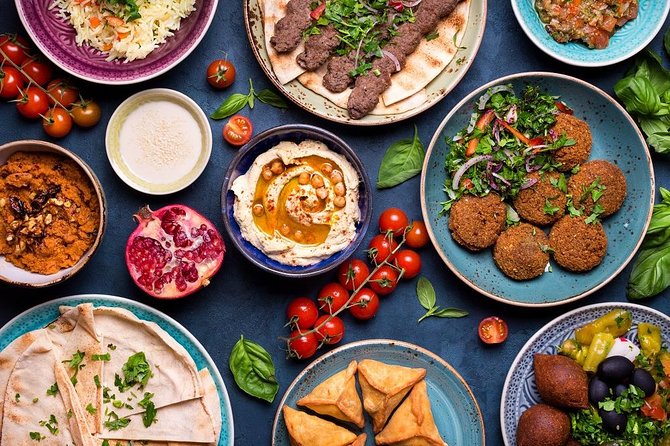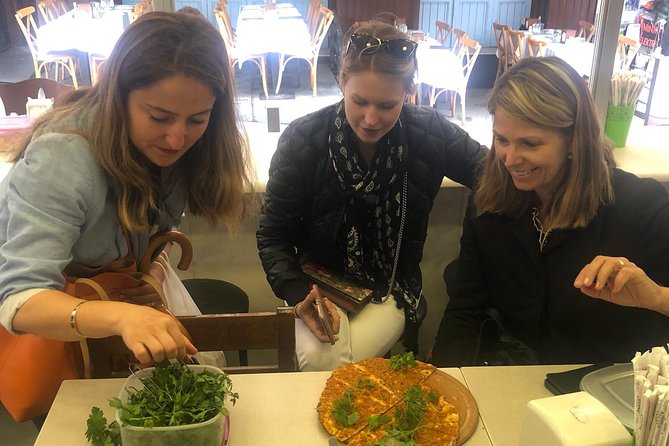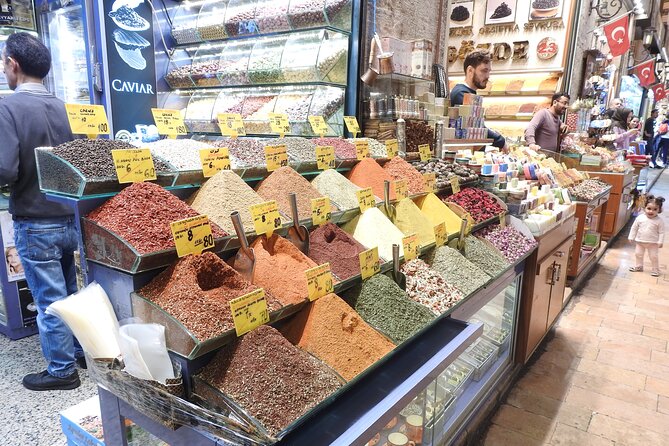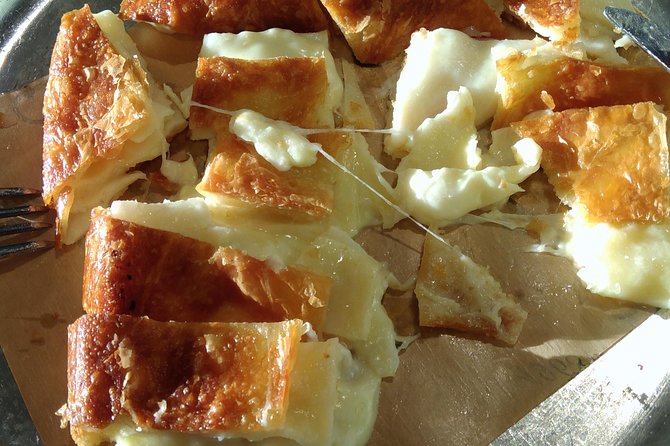Eating Like a Local: Learn About Diverse Culinary Culture of Turkey
While some may argue that exploring the culinary culture of a new country can be overwhelming, delving into Turkey’s diverse food scene is like embarking on a journey of discovery for the taste buds.
From the savory delights of kebabs seasoned to perfection to the sweet notes of baklava that melt in your mouth, Turkish cuisine offers a sensory experience like no other.
As one begins to unravel the layers of flavors and traditions woven into each dish, a fascinating world of culinary fusion and regional specialties unfolds, inviting enthusiasts to savor a tapestry of tastes waiting to be explored further.
Key Points

- Turkish cuisine blends Middle Eastern, Mediterranean, and Balkan flavors.
- Regional influences create diverse dishes like kebabs and baklava.
- Traditional cooking techniques include grilling for kebabs and slow-cooking stews.
- Meals in Turkey are social, featuring mezes, tea, and traditional dishes.
Culinary Fusion in Turkish Cuisine

In Turkish cuisine, the fusion of Middle Eastern, Mediterranean, Central Asian, and Balkan flavors creates a culinary experience that’s rich in diversity and depth. This amalgamation of fusion flavors results in a vibrant tapestry of tastes, offering a unique blend of savory, sweet, and aromatic profiles.
Turkish cuisine’s culinary diversity is evident in dishes like kebabs, baklava, mezes, and Turkish delight, each representing a different facet of the country’s cultural heritage. The use of common ingredients such as lamb, beef, eggplant, yogurt, and olive oil further enhances the depth of flavors present in Turkish dishes.
This fusion of culinary traditions not only reflects Turkey’s geographical location but also its historical interactions with various cultures, making each bite a journey through time and taste.
Diverse Turkish Dishes and Ingredients
The diversity of Turkish cuisine shines through a myriad of dishes and ingredients that reflect a rich tapestry of flavors and cultural influences. Turkish dishes offer a blend of regional variations and unique flavors that cater to a wide range of palates:
-
Iskender Kebab: A specialty from Bursa, consisting of thinly sliced lamb over pide bread, topped with tomato sauce and yogurt.
-
Hamsi Pilav: A Black Sea region delicacy featuring anchovies cooked with rice and regional herbs.
-
Kumpir: A popular street food from Istanbul, baked potatoes stuffed with various toppings like cheese, corn, and olives.
-
Kazandibi: A dessert from Izmir made with caramelized milk pudding, offering a creamy texture and sweet taste.
Traditional Cooking Techniques in Turkey

Traditional Turkish cooking techniques showcase a harmonious blend of time-honored methods and culinary expertise passed down through generations.
Grilling techniques are a fundamental aspect of Turkish cuisine, especially for preparing succulent kebabs like ‘shish’ and ‘kofte.’ The art of grilling over open flames imparts a unique smoky flavor that’s beloved by locals and visitors alike.
Plus, slow cooking methods play a significant role in creating rich and flavorful stews such as ‘kuzu tandır,’ where meat is cooked slowly until tender and infused with aromatic spices.
These techniques not only highlight the diversity of Turkish dishes but also demonstrate the intricate skills and attention to detail that define traditional Turkish cooking.
Influence of Regional Flavors on Turkish Food

Exploring the diverse regional flavors that influence Turkish cuisine reveals a rich tapestry of culinary traditions and ingredients. Turkish spice blends and Black Sea seafood traditions play significant roles in shaping the country’s gastronomy.
-
Turkish Spice Blends: Spices like sumac, cumin, and red pepper flakes are commonly used in Turkish dishes, adding depth and complexity to the flavors.
-
Black Sea Seafood Traditions: The Black Sea region offers a variety of fresh seafood options, influencing dishes like anchovy pilaf and hamsi tava.
-
Eastern Anatolia’s Kadayif: This region’s specialty dessert made of shredded phyllo dough, nuts, and syrup showcases the unique flavors of Eastern Anatolia.
-
Aegean Region’s Olive Oil Usage: Olive oil plays a prominent role in Aegean dishes, enhancing flavors and textures in classics like olive oil-based mezes.
Social Dining Customs in Turkey

Sharing meals in Turkey is a cherished communal experience, reflecting the country’s rich culinary traditions and strong emphasis on social connections. Family gatherings often revolve around elaborate meals where multiple generations come together to share not just food but also stories and laughter.
Tea culture is deeply ingrained in Turkish society, with tea being a staple beverage enjoyed throughout the day. Whether sipped while catching up with friends or offered as a gesture of hospitality, tea plays a central role in social interactions.
These customs highlight the importance of togetherness and bonding over food in Turkish culture, making every meal a heartwarming experience that goes beyond mere sustenance.
Culinary Exploration for Tourists

Enjoy the vibrant culinary tapestry of Turkey through a variety of unique gastronomic experiences tailored for travelers. Explore authentic food experiences and embark on culinary adventures that will tantalize your taste buds and broaden your culinary horizons.
Here are some must-try activities for foodies visiting Turkey:
- Join a traditional Turkish food tour to savor diverse dishes from different regions.
- Participate in cooking classes to learn how to prepare authentic Turkish recipes.
- Explore local markets such as the Grand Bazaar to discover unique ingredients used in Turkish cuisine.
- Indulge in dining at traditional restaurants accompanied by live music for an immersive cultural experience.
Turkey offers a rich tapestry of flavors waiting to be discovered by adventurous food lovers.
Food Tours and Cooking Classes in Turkey

Set out on a culinary journey through Turkey by indulging in food tours and participating in cooking classes to savor the rich tapestry of Turkish flavors. These experiences offer more than just a taste of authentic recipes; they provide a deep culture into the heart of Turkish gastronomy.
By joining food tours in bustling cities like Istanbul, visitors can explore local markets, sample a variety of dishes, and learn about the history behind each bite. Cooking classes, on the other hand, offer hands-on experiences where participants can master the art of crafting traditional Turkish dishes from expert chefs.
Both options not only satisfy taste buds but also provide a unique insight into the culinary heritage of Turkey.
Street Food Delights in Turkey

Strolling through the bustling streets of Turkey, one can’t resist the tempting aromas and vibrant displays of street food delights that offer a true taste of everyday Turkish cuisine. Turkish street eats are a culinary adventure not to be missed, showcasing authentic flavors and local favorites.
Here are four must-try street food delights:
- Simit: A popular circular bread encrusted with sesame seeds.
- Midye Dolma: Stuffed mussels filled with seasoned rice and herbs.
- Köfte: Grilled meatballs seasoned with spices and herbs.
- Lahmacun: Thin flatbread topped with minced meat, vegetables, and herbs.
These street foods not only satisfy hunger but also provide a glimpse into the rich tapestry of Turkish culinary traditions.
Common questions
What Are Some Lesser-Known Regional Specialties in Turkish Cuisine That Travelers Should Try?
Travelers exploring Turkish cuisine should sample regional delicacies like Black Sea fish dishes and Southeastern spicy Arabic-influenced meals. Food tours offer insight, while culinary workshops and cooking classes provide hands-on experiences to savor these hidden gems.
How Do Turkish Households Typically Prepare Meals for Special Occasions or Holidays?
Turkish households celebrate special occasions with traditional recipes and festive feasts. They gather with loved ones, enjoying mezes before main courses. Tea is a staple, and ‘raki’ is a popular choice. Meals are a social bond.
Are There Any Unique Dining Customs or Etiquette Rules That Visitors Should Be Aware of When Dining in Turkey?
When dining in Turkey, visitors should respect dining etiquette and cultural norms. It’s customary to remove shoes before entering a home, and guests should not start eating until the host says ‘afiyet olsun’ (enjoy your meal).
What Are Some Traditional Turkish Desserts That Are Not as Commonly Known Outside of Turkey?
When exploring traditional Turkish desserts, one might discover unique treats like ‘cezerye’ made with carrots and nuts. These sweet surprises reflect the fusion of flavors in Turkish cuisine, highlighting uncommon ingredients like sahlep and rosewater, creating delicious and memorable culinary experiences.
How Have Modern Influences and Global Trends Impacted the Traditional Culinary Culture of Turkey in Recent Years?
In recent years, modern influences and global trends have infused Turkish culinary culture with fusion dishes and culinary innovations. Culinary tourism has flourished, promoting traditional flavors while embracing food sustainability practices for a vibrant dining experience.
Last Words
To sum it up, exploring the diverse culinary culture of Turkey offers a feast for the senses and a journey through history. From the fusion of flavors to the traditional cooking techniques, Turkish cuisine is a reflection of the country’s rich heritage and regional influences.
Whether indulging in street food delights or savoring a traditional Turkish breakfast, visitors can enjoy the vibrant tapestry of flavors that define this unique gastronomic experience. Come hungry and leave satisfied, as Turkey’s culinary scene never disappoints.